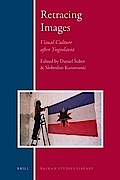New release: Retracing Images. Visual Culture after Yugoslavia. Edited by Daniel Šuber and Slobodan Karamanić
12. March 2012
Leiden: Brill 2012. (Balkan Studies Library, 4)
reference
The essays in this collection disclose cultural and political dynamics as they occurred before and in the wake of Yugoslavia's dissolution (1991-92) by analyzing visual data such as film, art, graffiti, street-art, public advertisement, memorials, and monuments. Within the vast field of Balkan Studies such visual materials have rarely been taken for important empirical evidence.
Against the still widely held presumption that the cultural production of allegedly "totalitarian" states such as Yugoslavia can be neglected as they were penetrated by state ideology, the contributions offer a corrective image of the complex ideological dynamics and discoursive potentials in various artistic and cultural fields. Phenomena such as "Titostalgia", nationalist mobilization, nation-branding, rewriting of history, inventing of traditions, and symbolic violence that have surfaced in recent years are interpreted in the light of Yugoslavia's legacy. (editor)
with contributions from: Zoran Terzić, Elissa Helms, Miklavz Komelj, Nebojša Jovanović, Isabel Ströhle, Sezgin Boynik, Gregor Bulc, Davor Beganović, Robert Alagjozovski, Gal Kirn, Mitja Velikonja, Daniel Šuber, and Slobodan Karamanić.
Dr. Daniel Šuber is Assistant Professor of Sociology at the University of Lucerne, Switzerland. Slobodan Karamanić is Ph.D. candidate in Anthropology of Everyday Life at the Ljubljana Graduate School of the Humanities. Both have been research associates at the Center of Excellence “Cultural Foundations of Social Integration,” research project “’Culture of the Wound’: On the Visual Routinization (Veralltäglichung) of Cultural Trauma in Serbia.”
